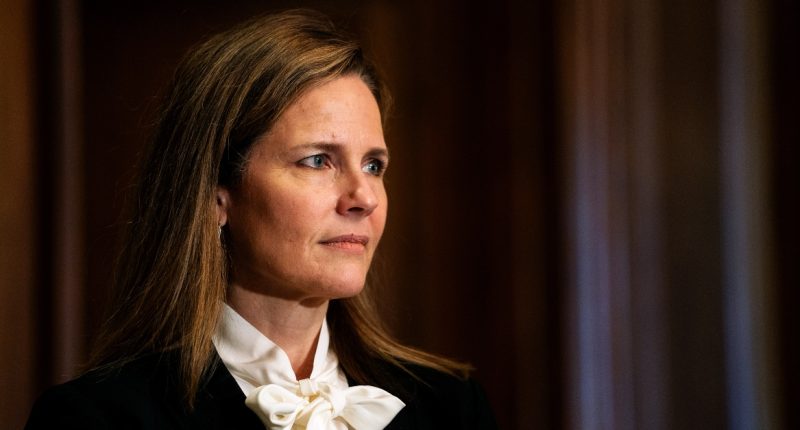Share this @internewscast.com
Associate U.S. Supreme Court Justice Amy Coney Barrett.
On Thursday, during the Supreme Court’s discussions regarding birthright citizenship, Justice Amy Coney Barrett emerged as a persistent challenge to the administration she serves.
In a detailed conversation with U.S. Solicitor General D. John Sauer, Barrett persistently questioned him about the administration’s intentions concerning compliance with judicial decisions.
Barrett started her inquiries by continuing the line of questioning initiated by Justice Elena Kagan, who generally has differing ideological views from Barrett.
“Did I understand you correctly to tell Justice Kagan that the government wanted to reserve its right to maybe not follow a Second Circuit precedent, say, in New York, because you might disagree with the opinion?” Barrett asked Sauer point blank.
The question is one central to the case before the justices. Though the executive order in question relates to birthright citizenship in the United States, it is the power of a district court to issue a nationwide injunction blocking enforcement of that — or any other president-issued order — that lies at the heart of the dispute. Donald Trump’s administration vehemently maintains that a federal court order issued in one circuit should not have the power to bind the other 1 circuits, or chaos and judicial overreach will reign.
During her questioning, Kagan not only pressed Sauer about the practicality of that position, but also about whether the Trump administration would commit to following a court order within the circuit it was issued. Sauer would not make such a commitment, either to Kagan or to Barrett.
In response to Barrett’s question, Sauer answered, “Our general practice is to respect those precedents, but there are circumstances when it is not a categorical practice.”
A shocked-sounding Barrett exclaimed, “this administration’s practice or the long-standing practice of the federal government?”
“As I understand it, long-standing policy of the Department of Justice,” came Sauer’s response.
“Really?” snapped Barrett.
Sauer stuck to his position, but began to drift by indicating that government refusal to follow court orders was a policy amorphously communicated to him.
“Yes, as it was phrased to me, we generally respect circuit precedent, but not necessarily in every case,” Sauer offered, then went on to suggest that pending litigation would somehow neutralize any requirement to follow judicial orders. “Some examples might be a situation where we are litigating to get that circuit precedent overruled and so on.”
Barrett tried again, clarifying to Sauer that she was not talking about a situation in which the government is embroiled in litigation to overturn a decades-old outdated precedent.
“I’m talking about in this kind of situation,” Barrett hypothesized. “I’m talking about this week, the 2nd Circuit holds that an executive order is unconstitutional, and then what do you do the next day or the next week?”
“Generally, we follow it,” replied Sauer, emphasizing the word “generally.”
“So you’re still saying generally?” argued Barrett.
“Yes,” said Sauer.
“And you still think that it’s generally the long-standing policy of the federal government to take that approach?” asked a clearly unconvinced Barrett.
Sauer would not budge, answering again, “generally.”
Barrett opted to bring the Supreme Court itself, and its history, into the discussion. The justice asked Sauer whether he accepted a “Cooper v. Aaron situation” for the Supreme Court, but not for the circuit courts. Barrett’s reference was to the unanimous 1958 Supreme Court ruling that denied Little Rock, Arkansas, the right to delay school desegregation after the ruling in Brown v. Board of Education. The precedent stands for the concept that states are bound by and must enforce the Supreme Court’s decisions even when the disagree with them.
Sauer allowed that “in the vast majority” of cases, the federal government would follow both the judgment and the opinions of federal circuit courts just as it follows Supreme Court rulings, but that it “has not been a categorical practice” to do so.
“So you’re not hedging at all with respect to the precedent of this Court?” asked Barrett, as she closed out the discussion of the administration’s willingness to follow court orders.
Barrett still was not done skewering Sauer. Next, she turned her questions to the government’s choice to focus only on the legality of a nationwide injunction, rather than asking the justices to weigh in on the matter of birthright citizenship itself. Sauer advanced the position that the risk of having rushed “fast and furious” consideration of the merits is precisely why nationwide injunctions should be outlawed.
Barrett was noticeably unconvinced.
“But the government’s done that in other cases,” Barrett remarked, before shifting gears a final time.
Barrett concluded her questioning by asking Sauer what the practical difference is to the government between a nationwide injunction and an adverse ruling in a class-action lawsuit.
“Why does the government care?” asked Barrett. “Does the government get anything different?”
“Absolutely,” answered Sauer. “The represented class members are bound in the class action. That means if they lose, they’re bound by that as well. So they’re taking a grave risk.”
“It has symmetry,” Sauer continued. “The government is bound if we lose.”
“And you would respect that judgment?” asked Barrett, bringing the conversation right back to its point of origin.
This time, however, Sauer answered, “We would be bound by that judgment and so would they.”
Much to the dismay of conservatives, Barrett sided with the Court’s dissenting liberals in April in a 5-4 decision on Trump administration’s deportation of deporting Venezuelan migrants via the Alien Enemies Act of 1798. Weeks later, Barrett banded together with Chief Justice John Roberts and the liberal justices in refusing the Trump administration’s request to halt a federal judge’s order requiring the government to pay out nearly $2 billion in foreign aid.
Barrett’s positions have elicited responses from Trump supporters who now say they regret her appointment — and expect that Trump feels the same.
One conservative commentator posted Wednesday after oral arguments, “Amy Coney Barrett (ACB) is proving once again she may [be] the worst SCOTUS pick ever by a Republican. She has a lifetime appointment to the Supreme Court because of Donald Trump. Yet you can hear her disdain for the Trump administration.”
Another posted, “Sad that Justice Amy Coney Barrett was a wasted pick. Strong conservative her entire career, gets to the Supreme Court, and becomes a weak liberal.”
You can listen to Thursday’s full oral arguments here.
Love true crime? Sign up for our newsletter, The Law&Crime Docket, to get the latest real-life crime stories delivered right to your inbox.

















